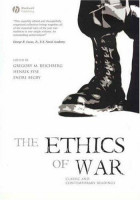
The ethics of war
classic and contemporary readings
Note:
Table of Contents Preface Part I: Ancient and Early Christian 1. Thucydides (ca. 460 - ca. 400 BC): War and Power 2. Plato (427 - 347 BC): Tempering War among the Greeks 3. Aristotle (384 - 322 BC): Courage, Slavery, and Citizen Soldiers 4. Roman Law of War and Peace (7th century BC - 1st century AD): Ius Fetiale 5. Cicero (106 - 43 BC): Civic Virtue as the Foundation of Peace 6. Early Church Fathers (2nd - 4th century): Pacifism and Defense of the Innocent 7. Augustine (354 - 430): Just War in the Service of Peace Part II: Medieval 8. Medieval Peace Movements (975 - 1123): Religious Limitations on Warfare 9. The Crusades (11th - 13th century): Christian Holy War 10. Gratian and the Decretists (12th century): War and Coercion in the Decretum 11. John of Salisbury (ca. 1120 - 1180): The Challenge of Tyranny 12. Raymond of Penafort (ca. 1175 - 1275) & William of Rennes (13th century): The Conditions of Just War, Self-Defense and their Legal Consequences under Penitential Jurisdiction 13. Innocent IV (ca. 1180 - 1254): The Kinds of Violence and the Limits of Holy War 14. Alexander of Hales (ca. 1185 - 1245): Virtuous Dispositions in Warfare 15. Hostiensis (ca. 1200 - 1271): A Topology of Internal and External War 16. Thomas Aquinas (ca. 1225 - 1274): Just War and Sins against Peace 17. Dante Alighieri: (1265 - 1321): Peace by Universal Monarchy 18. Bartolus of Saxoferrato (ca. 1313 - 1357): Roman War in Christendom 19. Christine de Pizan (ca. 1364 - ca. 1431): War and Chivalry 20. Raphael Fulgosius (1367 - 1427): Just War Reduced to Public War Part III: Late Scholastic and Reformation 21. Erasmus of Rotterdam (1466 - 1536): The Spurious 'Right to War' 22. Cajetan (1468-1534): War and Vindicative Justice 23. Niccolo Machiavelli (1469 - 1527): War Is Just to Whom It Is Necessary 24. Thomas More (ca. 1478-1535): Warfare in Utopia 25. Martin Luther (1483-1546) and Jean Calvin (1509-1564): Legitimate War in Reformed Christianity 26. The Radical Refor.